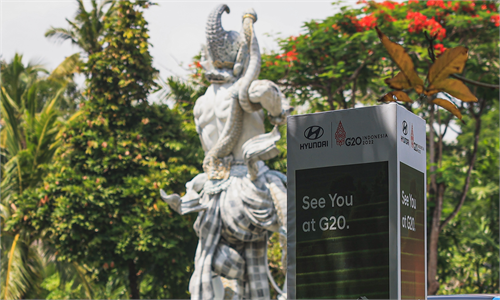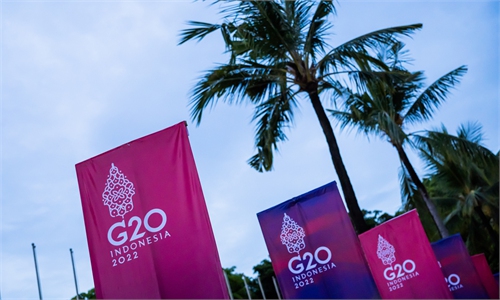As global attention shifts to Indonesia for G20 summit, a troubled world 'waits' for China's leadership

Police officers patrol a street ahead of the G20 Summit in Bali, Indonesia on November 13, 2022. Indonesia will host the leaders of the world's biggest economies on November 15-16. Photo: VCG
Bali, Indonesia, used to attract millions of visitors each year from around the world before the COVID-19 pandemic as a globally renowned vacation paradise, is now gearing up to host dozens of special guests, as leaders of the Group of 20 (G20) countries and other world leaders are arriving at the island to attend the G20 Leaders' Summit from Tuesday to Wednesday.
However, apart from the marvelous scenery, what awaits world leaders is a confluence of acute global challenges that desperately needs to be addressed.
As the world, which is facing rising geopolitical tensions and a worsening economic downturn, looks to the G20 Leader's Summit for solutions to a litany of global crises, many in Indonesia and around the world are pinning their high hopes on China to play a greater leadership role in tackling these global challenges and leading the world to a more peaceful and prosperous future.
Against this backdrop, Chinese President Xi Jinping's attendance at the summit has attracted widespread attention in Indonesia and around the world. Xi's participation will be crucial in ensuring the G20 summit's success, foreign experts told the Global Times.
Great expectations
"President Xi's participation is vital to making the G20 summit succeed this year," John J. Kirton, director of the G20 Research Group and director of the G7 Research Group at the University of Toronto, told the Global Times in a recent interview.
"China has importantly helped the G20 survive and thrive during the years when the US was led by an isolationist, unilateralist Donald Trump," Kirton said, "China's constant primary priority has been development, and this is more important than ever, with progress toward all 17 of the UN 2030 Agenda's Sustainable Development Goals having gone into reverse."
The expectation for Xi's arrival is particularly palpable in Bali and across Indonesia. "There have been many changes in Bali because many leaders will arrive soon and President Xi will also come here," a local resident of Chinese descent surnamed Xie, told the Global Times on Saturday night with an apparent sense of affability and affection.
Beyond such admiration for the Chinese president is also growing hope for China to take a greater leadership role in tackling regional and global challenges and leading the world out of the current predicament.
"China should take a more active role in regional and global issues. We are waiting for China to take a greater leadership role. This is not a subjective view but an objective one based on some research on the successful Belt and Road Initiative cooperation with Africa and ASEAN. Our world needs such cooperation and partnership in economic sectors, rather than geopolitical conflicts," Veronika S. Saraswati, China Study Unit Convener at the Centre for Strategic and International Studies Indonesia, told the Global Times on Sunday.
Specifically, "China should take a more active role in sharing prominent ideas to develop world economic sectors amid global downturn and recession," said Saraswati.
In stark contrast to the great anticipation for China's role at the G20, many are also concerned that some Western countries, particularly the US, are seeking to use the Bali summit to advance their own geopolitical agenda against Russia, therefore preventing the crucial meeting from tackling serious economic issues.
Due to such concerns, many analysts worry that the G20 summit will not be able to produce a joint declaration, as previous ministerial meetings also failed to produce joint communiqués due to Western officials' focus on the Russia-Ukraine conflict.
Reject geopolitics
"It's not very wise for Global North countries to try to bring geopolitical issues to the G20. This is very bad and inhumane planning. We have to reject that, and I believe our Indonesian government will not support this planning since it may lead to the chaotic situation and will worsen this uncertain and unstable world," Saraswati said. "This is not a good time for playing geopolitical conflicts as the world faces such economic challenges that may bring more suffering."
This concern is felt by people around the world. The World Economic Forum's Global Risk Report 2022 showed that 84.2 percent of the respondents feel worried about the current world situation due to COVID-19 and other uncertainties. Meanwhile, the IMF in October warned the global economy was headed for "stormy waters" and "the worst is yet to come," adding that aggressive interest rate increases could spur a harsh global recession.
Such a dire situation caused primarily by the COVID-19 pandemic has also been palpable in Bali. Before the pandemic, the resort island attracted around 6 million visitors each year, but in 2020, the number of foreign visitors plunged to 1 million and to just a few dozens in 2021, according to market and consumer data portal Statista. Tourism is a crucial part of Indonesia's economy.
Against such a dire backdrop, as the host of the G20 summit, Indonesia is seeking to focus on tackling economic challenges and inspiring unity, as it adopted "Recover Together, Recover Stronger" as the theme of the summit.
Such a pursuit of economic development is also in line with China's focus on peace and development, experts said.
"China's Global Development Initiative could well be an inspiration and model for what the G20 Bali Summit does on development this year," said Kirton.
Safeguarding multilateralism
Although the US and some of its Western allies have been using the platform for geopolitical issues in recent years, the G20 was first created to coordinate global efforts to tackle economic challenges.
In 2008, amid the severe global financial crisis, the first G20 summit was convened in Washington, DC, where world leaders came up with what has been widely seen as the largest and most coordinated fiscal and monetary stimulus ever undertaken, which succeeded in averting the risk of an economic depression. China has played a very important role at the G20 over the years, analysts said.
In addition to attending the G20 summit in Bali, Xi will also hold several bilateral meetings at the sidelines with other world leaders, including bilateral meetings with French President Emmanuel Macron and US President Joe Biden. Bilateral meetings with other world leaders, including the closely watched meeting with Biden, will also help inject positivity into a world of profound uncertainty, analysts said.
"Many countries worry that China-US tension could lead the world into bloc confrontation and turn globalization into fragmentation. Therefore, the meeting between the two leaders at the G20 is also intended to send a certain positive signal and give the world some reassurance," Wang Yiwei, director of the Institute of International Affairs at the Renmin University of China, told the Global Times on Sunday.
The face-to-face meeting, the first for the Chinese and US presidents since Biden took office, comes amid rising tension between the world's two largest economies due to the US' escalating containment strategy against China and constant challenges to China's sovereignty over the Taiwan question.
At the meeting, the Chinese side will likely make clear to the US its firm stance on safeguarding sovereignty, security and development interests, while also raising constructive points for lowering tensions between the two countries, said Lü Xiang, research fellow at the Chinese Academy of Social Sciences.
In addition, as the US tramples on multilateralism for its own interests, which seriously undermines the G20 and other multilateral mechanisms, the China will "fully express its constructive stance during the G20, seek maximum consensus among participating countries, and strive to be a positive force for the economic downturn facing the world," Lü told the Global Times on Sunday.
The US is likely to continue its hegemonic, unilateral and protectionist approach at the G20, nonetheless, as the stage is set in Bali, the world will see first-hand just who is promoting peace and development and who is preaching war and confrontation, analysts noted.




